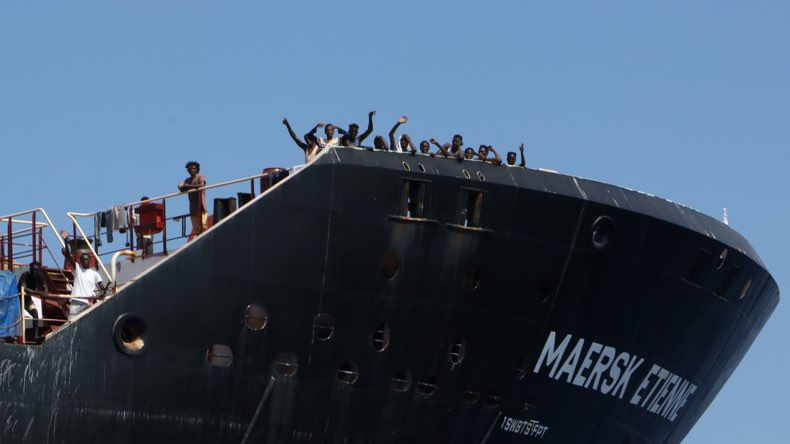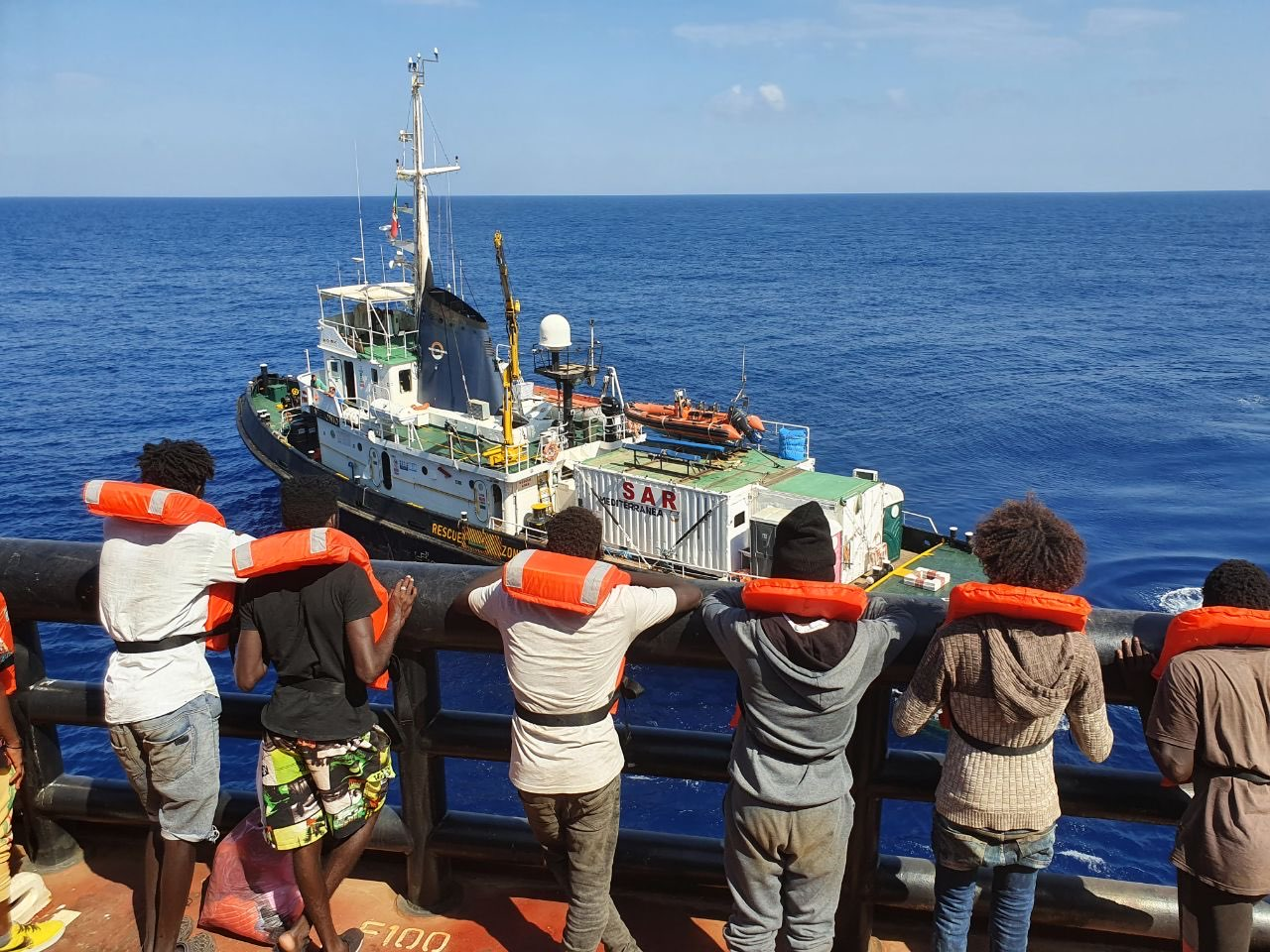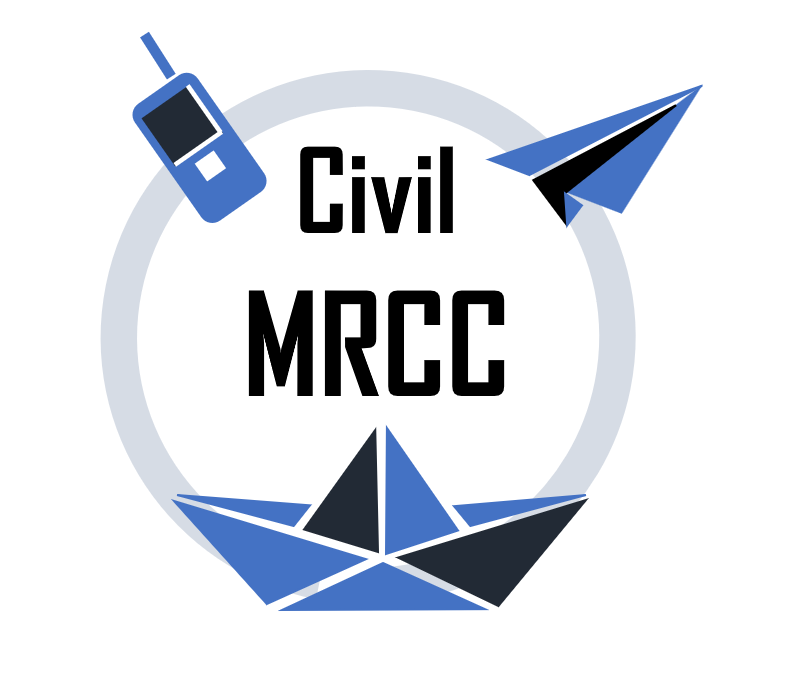It was July 2004 when the Cap Anamur case exploded. The German humanitarian ship, while returning from delivering aid to Africa, had rescued 37 people from a sinking rubber dinghy. They were kept offshore for several days. Then, when the ship was finally authorised to dock at Porto Empedocle in Sicily, the 37 survivors were detained in a “CPT”, a detention and deportation center (and most of them were later deported), while three crew members – including Captain Schmidt – were arrested and then tried for “aiding and abetting illegal immigration”. With the endless delays of the Italian “justice” system, it was only in October 2009, after a long trial, that they were acquitted of all charges by the Court of Agrigento. That ruling affirmed two principles that are still very important today: those who carry out sea rescues do not commit any crime, and the captain is the only person who can identify a “place of safety” even from a legal point of view, for disembarkation.
We remember this case today for a specific reason: not only because it was the first failed attempt to criminalise solidarity at sea in Italy, but above all because, in twenty years, it has been the only trial held against an NGO for rescue at sea. So far. There have been numerous investigations. But all for nothing: none of them – the most sensational case being that of Trapani against Iuventa Crew, MSF and Save the Children – has ever made it past the preliminary hearing stage. Until now.
On the 28th of May the Ragusa Public Prosecutor’s Office obtained the indictment of six activists and seafarers from Mediterranea Saving Humans, who will stand trial starting next 21st October on charges of “aggravated aiding and abetting illegal immigration”. The story is well known: at the beginning of August 2020, after an Alarm Phone and Frontex plane notice, the oil tanker Maersk Etienne rescued 27 people sinking in the Maltese SAR zone. Although the Maltese authorities coordinated the rescue operation, they never assigned a “Place of Safety” and the 27 migrants were forced to spend 37 days on a ship floating in the Central Mediterranean without medical facilities and proper accommodation. It was probably the longest stand-off in the history of the Mediterranean sea. The 27 people were already in critical condition due to their arduous journey, including prolonged detention, torture, and rape suffered in Libya. The Mare Jonio answered a request of assistance from the captain of the Maersk Etienne and the medical staff of Mediterranea went on board, immediately realizing the unbearable conditions of the survivors. On the 11th of September a transhipment was organized, and the Mare Jonio immediately set sail toward Sicily, where the migrants were eventually authorized to disembark by the Italian authorities in Pozzallo.

Maersk Etienne tanker’s survivors ready to be rescued on Mare Jonio ship, September 2020 (Credits: Mediterranea)
Secretly, and probably connected to the spying that started against Mediterranea in 2019 (as the Italian government recently admitted), a special police investigation was launched right away. It included phone tapping, tailing, house searches, and seizures, and went on until February 2023. More than three months after the landing, the shipping company Maersk Tankers made a legal and transparent donation to support humanitarian activities at sea. For the prosecutor, this would be the infamous aggravating circumstance of having “acted for profit” on the basis of a “commercial agreement”. This circumstance is completely refuted by the evidence gathered in the reconstruction of the facts.
Meanwhile the privacy of those under investigation was violated on several occasions, with personal chats leaked to the far-right press to fuel scandalous campaigns, culminating in the preliminary hearing in Ragusa, which lasted from December 2023 to May 2025.
But the referral to trial coincidentally comes at a particularly difficult political moment for the Italian government, which for months has been unable to resolve either the Almasri case or the Paragon case. In the former, Prime Minister Meloni, Ministers Nordio, and Piantedosi and Undersecretary Mantovano are under investigation by the special “Tribunale dei Ministri” (Ministers’ Court) for releasing (and returning to Libya on a State executive flight) the dangerous criminal responsible for human trafficking and all kinds of violence against migrants detained in Mitiga prison and elsewhere. In recent days, in particular, it has emerged that Justice Minister Nordio allegedly lied to parliament to conceal the circumstances surrounding the political decision to take away Almasri from the International Criminal Court.
In the second case, while the government has officially admitted to spying on two co-founders of Mediterranea and the president of Refugees in Libya using powerful and sophisticated spyware called “Graphite” developed by Paragon Solutions, the names of many other journalists and activists who were also under surveillance are emerging, raising serious concerns about respect for constitutional rights and freedoms in a sort of “Spaghetti Watergate” case.
Finally, along with the two cases mentioned above, the recent push-back by the Cyrenaica government of Interior Minister Piantedosi, while he was at Benghazi airport with a delegation composed of EU Commissioner for Migration Brenner and the ministers of Malta and Greece, precisely to negotiate further detention and deportation of migrants at the European border, demonstrates once again that Libya is the real “black hole” of Italian and European politics. The stubbornness to stop people on the move in that country at all costs not only causes the immense suffering and deaths we are familiar with, but also a chain of political and diplomatic failures, which demonstrate that EU border management policies are not only cruel and inhumane, but also completely irrational and unrealistic in their implementation.
This is the scenario in which, next October, the opening of the trial against Mediterranea in Ragusa will coincide with the parliamentary debate in Rome on the renewal of the deadly Italy/Libya Memorandum. Not only have they prepared their revenge against the Mare Jonio and Mediterranea, but they also want to try to criminalise all solidarity in order to hide their tragic failures too.
They will not find us unprepared: on the one hand, we will face the trial with great serenity, confident that we will be able to dismantle the castle of accusations piece by piece. And, starting with the personalities we will call as witnesses, we will transform the trial against solidarity into a trial against the omissions committed by the European authorities, in the Maersk Etienne case, as in all these years.
On the other hand, we are relaunching and strengthening our rescue and solidarity efforts, both at sea and on land: thanks to cooperation within the Civil Fleet, we have acquired a new and larger ship, the former Sea-Eye 4, part of the United4Rescue alliance, which will soon set sail on her first mission at sea under the name Mediterranea.
And, all together, in the campaign for the trial and against the renewal of the infamous Memorandum, we will be able to point out who should be in the dock for all the violations of fundamental human rights and crimes against humanity committed in recent years in the Mediterranean Sea. We will do so with a smile on our lips, but also determined to ensure that “never again” becomes a reality.

Maersk Etienne tanker’s survivors ready to be rescued on Mare Jonio ship, September 2020 (Credits: Mediterranea)
Mediterranea Saving Humans (Italy), July 2025



